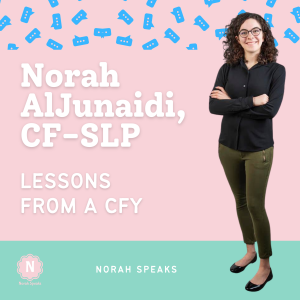Lessons from a CFY: Week 5

It’s hard to believe this is my fifth week working!
As I’m more adjusted to the routine, I’m focusing more on efficiency.
Making Goals
Developing a mentality for how you write, organize and prioritize goals is a critical step to efficiency in therapy. This week, I try to focus on that.
Lessons from a CFY 5.1: Less is More
My mentality for goals is:
Less is more.
In graduate school, I had a client with goals pretty much in every area we work on as SLPs. My co-clinician and I made a complex, detailed hierarchy of goals in multiple communication, fluency, voice and language areas. It was overwhelming for us. I imagine it was overwhelming for the person who treated him next. In my new job, I have a lot of clients with a similar plan of care. Now, one of my projects is looking at my client’s goals and picking out the ones that are most appropriate for them at this time. This is based on factors like parent goals, severity of deficit/life impact, and cognitive level. That way I can focus on a few goals and progressing the kid through them before adding goals at a higher level.
I am super excited to get organized and develop appropriate goal strategies for my clients. I created a huge document with goals from each of my patients so I can have all their goals and pick the ones I want to target first. and use a spreadsheet to track their progress over 5-10 sessions.
Efficiency is My New Favorite Word
Working at a private practice, time is very valuable. There really is very little free time during the day. You have to pick and choose what you work on. One way I’ve learned to save time is how I design my activities.
Lessons from a CFY 5.2: Designing Activities
At five weeks in, I’m also pretty familiar with my caseload. I have an idea of who has similar goals. I made a powerpoint for myself with activities that could work for 2-3 of my kiddos every week. It helps me feel more confident doing the treatment by repeating a similar activity, and more efficient with my time. Additionally, if an activity doesn’t work for a client, I can pick a different one, or have a few activities that are similar that address the same goal. Some children have certain interests, so I like to pick games or reading passages with a few different themes for variety (e.g. making a pizza, making a car, making a cake games). Regardless, these methods keep me prepared, with more time, and able to switch around activities if one isn’t working.
It’s short and sweet, but those are my lessons for the week. Next week I start my second job working in a university clinic with autistic students with ASD, and I cannot wait!

